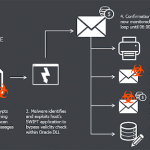A Swift cyber-attack, similar to one that saw $81m (£56m) stolen from Bangladesh’s central bank, has reportedly hit a second bank.
The warning about the second attack came from Swift, which oversees the financial messaging

Swift cyber-attack
network that underpins global money transfers.
Swift said the target was a commercial bank but did not name the organisation or reveal if any cash had been taken.
The attack used techniques and tools resembling those used to steal cash from Bangladesh in February, it said.
Swift is used by about 11,000 financial institutions around the world to move large amounts of cash.
The attackers had a “deep and sophisticated knowledge of specific operational controls” at the targeted bank, and could have been aided in their theft by “malicious insiders”, said Swift.
In both attacks the thieves sought to submit fraudulent messages to the Swift network to transfer large amounts of cash to accounts they controlled.
Spelling mistake
Analysis of February’s attack suggested the gang aimed to steal about $1bn by moving cash from an account held by Bangladesh’s central bank at New York’s Federal Reserve to other accounts.
A spelling mistake in one of the transfer orders alerted staff and stopped much of the money going astray.
The second attack showed that the Bangladesh theft was not an isolated incident but “part of a wider and highly adaptive campaign targeting banks”, said Swift.
It added that its core network remained secure despite the attempts by cyberthieves to manipulate it.
In April, Swift released software updates that it said would help customers improve security.
An investigation into February’s attack revealed that the cyberthieves won access to the central bank network because of poor security controls.
The bank had no firewall, which is designed to block unauthorised access requests. It also used second-hand internet routers, which had cost $10, to connect to global financial networks.






